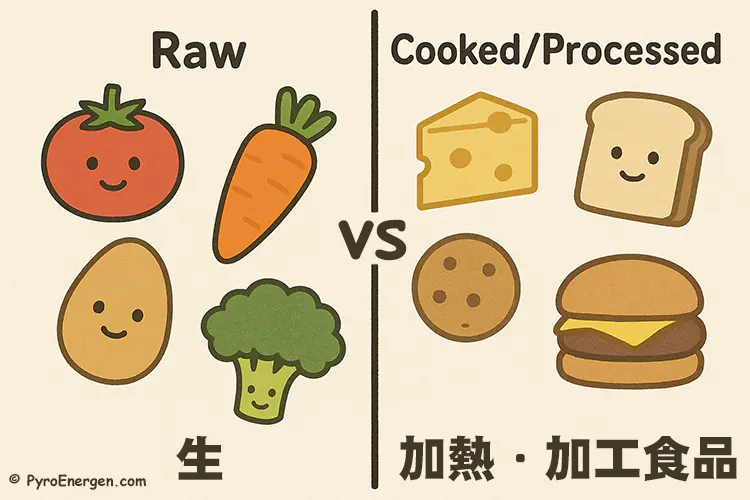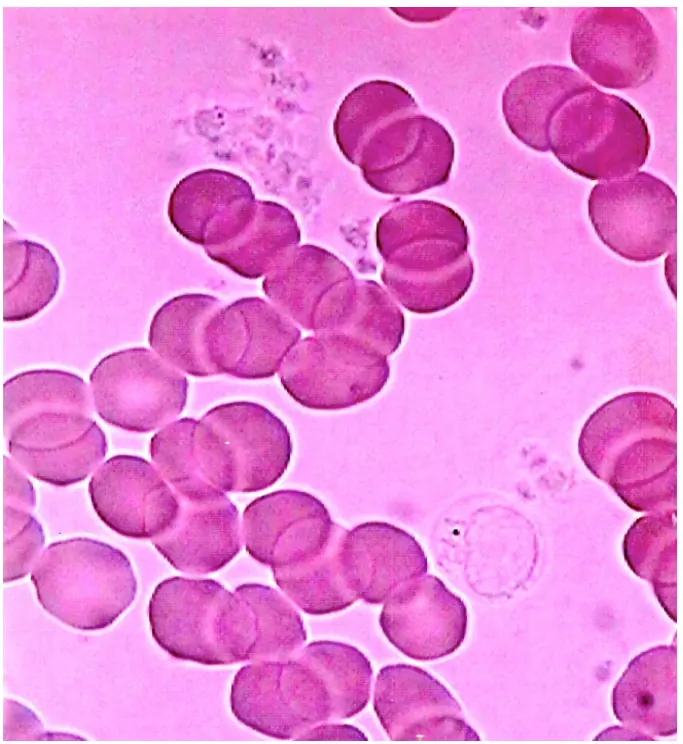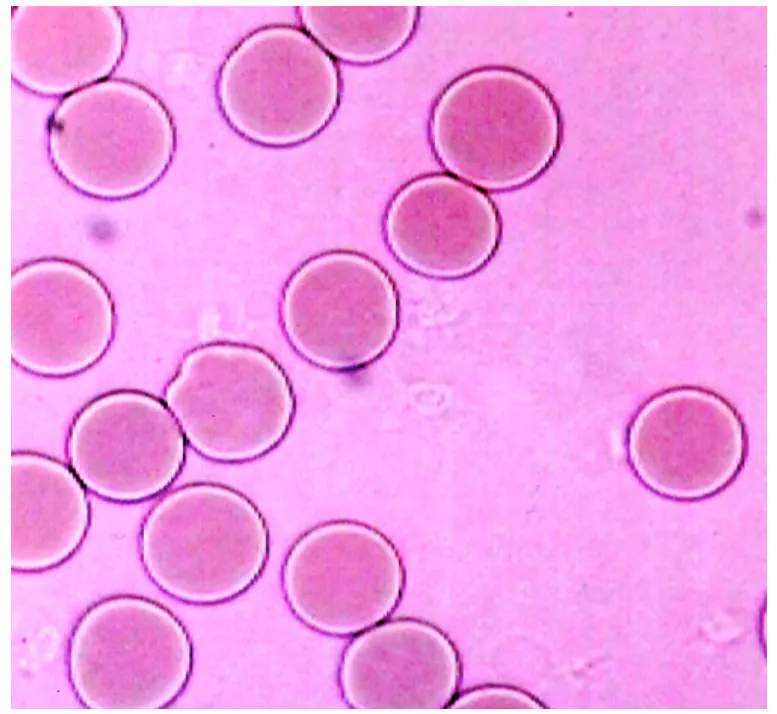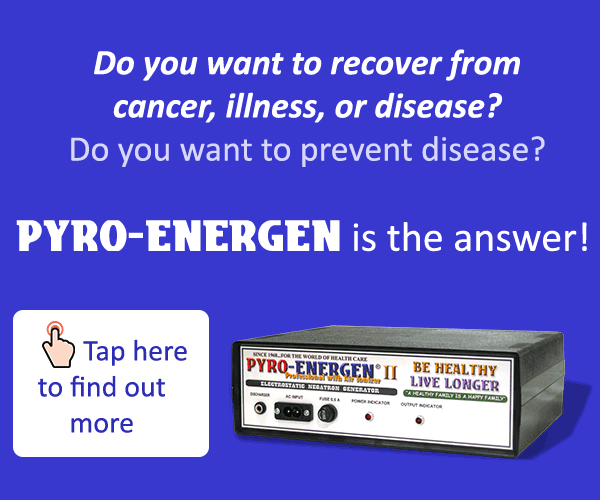Raw vs. Cooked: How Enzymes Impact Your Digestion, Aging, and Disease Risk
Updated: April 24, 2025
You hear the word "Enzyme" a lot nowadays, and you often see posters and ads featuring the word "enzyme". Even everyday products like washing detergents contain enzymes. But what exactly are enzymes, and why are they so important for our lives?
What Are Enzymes and Why Are They Essential?
In the post-war era, scientists initially thought that carbohydrates, protein, and fat were the three essential nutrients required for life. However, they realized carbohydrates alone weren't enough for proper metabolism. Vitamins and minerals were added, bringing the count to five essential nutrients. But even then, they found that minerals weren't always properly utilized. So, they added a previously overlooked substance, dietary fiber, as the sixth essential nutrient.
These six nutrients are indeed very important. However, beyond these, there was another crucial element necessary to sustain life. That element is the enzyme.
Enzymes are essential to sustain life. They work in cooperation with vitamins and minerals, acting as catalysts to speed up chemical reactions. Without them, most chemical reactions in our cells would happen far too slowly to support life.

The Vital Functions of Enzymes
But enzymes do more than just act as catalysts. When the body has an abundance of enzymes, it can better protect itself and repair damage, potentially warding off many degenerative conditions! Without sufficient enzymes, we may age faster, develop diseases earlier, and experience physical and cognitive decline as our bodies break down. Neither humans nor animals can live without enzyme activity. They are, in essence, central to life's activities and fundamental to our existence.
When we take supplements, even in the correct form, most people assume the nutrients are automatically utilized to support the body. Wrong. Without the help of digestive enzymes, many nutrients from supplements might not be properly absorbed. Instead, metabolic enzymes might use significant energy just trying to process these undigested substances or clear them from the bloodstream. This means the nutrients aren't supporting the body's needs as intended, potentially contributing to deficiencies rather than correcting them.
More than 5,000 enzymes are known. Enzymes are typically named using the ending "-ase" combined with the name of the chemical they transform (the substrate). For example, lactase is the enzyme that breaks down lactose. Scientists continue to discover and name new enzymes.
Each enzyme performs a specific task. Therefore, the known 5,000+ enzymes perform over 5,000 different functions in the body.
Heat, Raw Foods, and Enzyme Sources
Enzymes are sensitive to heat and can be weakened or destroyed by cooking. This sensitivity to heat is a key reason why consuming primarily cooked or processed foods might contribute to health issues. When we eat cooked or processed foods, we are essentially eating "dead" or denatured foods. These foods lack active enzymes, and many nutrients can be significantly diminished during processing or cooking. Therefore, it's beneficial to include raw foods in your diet, as they contain active enzymes.
What kinds of foods contain more enzymes? Raw fish, meats, vegetables, and fruits, as well as fermented foods, contain abundant enzymes. Fermented foods are particularly rich in enzymes, sometimes referred to as 'food enzymes' or 'fruit and vegetable enzymes'.
When eating cooked fish or meat, try adding a side of raw vegetables. Their enzymes can aid digestion.
Consequences of Enzyme Deficiency: Digestion, Blood, and Aging
Remember that a lack of enzymes in the body can make the blood "dirty", potentially laying the groundwork for many kinds of diseases.
As mentioned earlier, protein itself isn't directly used for energy; the body doesn't absorb whole proteins. Proteins, like other macronutrients, must be broken down by specific enzymes (like proteases) to be absorbed and utilized. Similarly, carbohydrates require enzymes like amylase.
However, if there isn't enough amylase, carbohydrates may not be fully digested. Undigested sugars, like "glucose", can still be absorbed and enter the bloodstream. This undigested or improperly processed sugar can make the blood sticky, causing red blood cells to clump together.

|

|
Healthy red blood cells are flexible and can pass through even narrow capillaries. However, if the blood is "sticky" and cells clump together (as shown in the left figure), blood flow becomes inefficient. This poor circulation can contribute to various diseases. This situation can arise from overeating and consuming a diet high in cooked and processed foods, which significantly reduces enzyme intake and availability.
Researchers have found that younger people can have up to 30 times more amylase in their saliva than older people. This might explain why younger individuals often seem to handle diets high in bread, pasta, and other cooked foods with fewer immediate problems. However, relying on such a diet long-term may accelerate aging and deplete the body's enzyme reserves.
Some people eat a well-balanced diet yet remain unhealthily thin. Conversely, others might eat less or follow a vegetarian diet, yet struggle with excess weight. This suggests that enzyme function within the body plays a significant role beyond just the type or quantity of food eaten.
Bear in mind, when you feel weak, tired, or sick, try focusing on easily digestible foods rich in enzymes.
Things to Remember:
- The source of many health problems can be traced back to improperly digested foods.
- The human body may struggle to fully break down all the food we eat, especially without sufficient enzymes.
- Cooked and processed foods can overwork the body and drain its energy reserves.
- Undigested food particles entering the bloodstream can divert the body's "protector and repair" systems (like the immune system) from their primary tasks.
- Fat can be an excellent energy source, but only when fully digested; properly digested fat is "good fat".
- It has been clinically suggested that the more enzymes you have available (through diet or supplements), the more quickly your body may be able to restore, repair, and strengthen itself.
- Combining digestive enzymes, vitamins, ionic minerals, and clean water can give your body crucial support.
- We have a choice: to enhance the body's ability to protect and repair, or to continually drain its energy and enzyme reserves. Your choice will be a determining factor in your long-term health.
Reprint Rights: You may reprint this article within your website, blog, or newsletter as long as the entire article remains the same as well as the “About the Author” box.



 Junji Takano is a Japanese health researcher involved in investigating the cause of many dreadful diseases. In 1968, he invented PYRO-ENERGEN, the first and only electrostatic therapy machine that effectively eradicates viral diseases, cancer, and diseases of unknown cause.
Junji Takano is a Japanese health researcher involved in investigating the cause of many dreadful diseases. In 1968, he invented PYRO-ENERGEN, the first and only electrostatic therapy machine that effectively eradicates viral diseases, cancer, and diseases of unknown cause.


